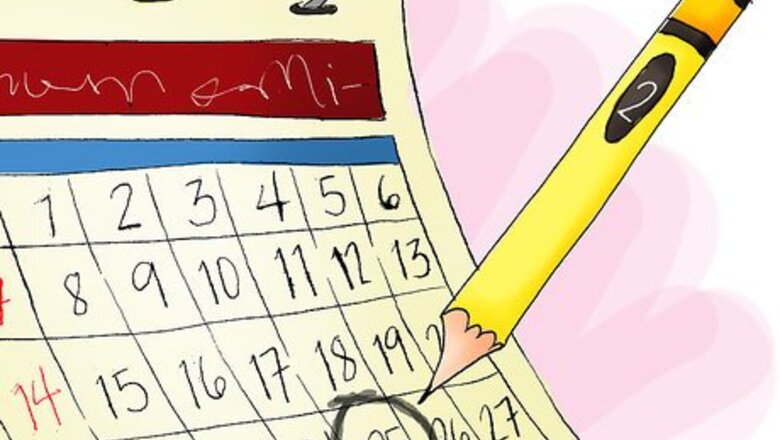
views
Creating a Study Schedule
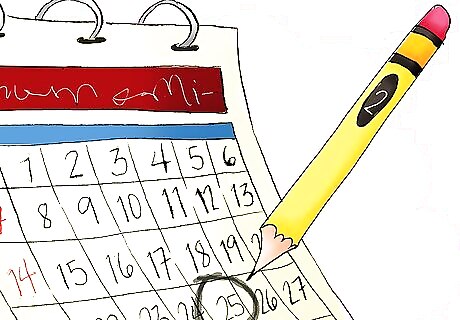
Mark the date of the exam on your calendar as soon as you register for it. You likely know well in advance that you need to take the entrance exam and can register for it quite early. As soon as you register for the exam, mark your calendar or agenda so that you can plan out how much time you need to give yourself to prepare.
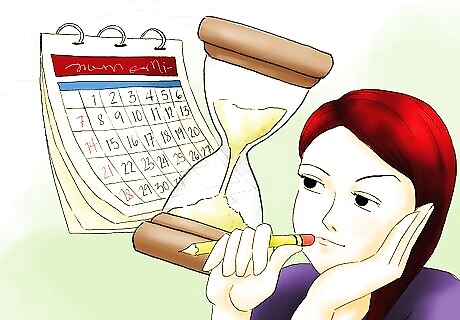
Decide how much time you will devote to studying and preparing. Based on how much time you have until the exam, decide how much time you are going to give yourself to prepare. Most students take anywhere from 1-3 months to prepare in advance of the exam. The amount of time you want to spend is highly individual. Think of your schedule leading up to the exam: Will there be any holidays? Does your family have any trips planned? What will your school schedule be like? Choose an amount of study time that can accommodate your schedule. Generally speaking, if you have a busier schedule, it would be best to give yourself more time to accommodate for any days that you are simply too busy to study.
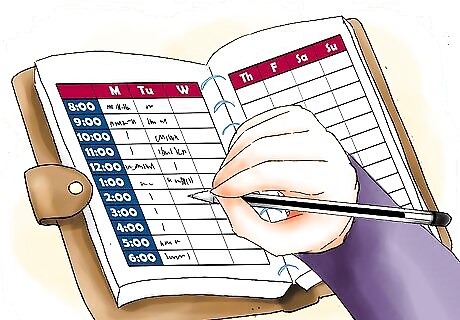
Make a calendar or schedule of the months or weeks leading up to the exam. On this calendar you will mark all of the days you plan to study, as well as all of the days you plan to give yourself a break. Mark any days that already have something planned, like work, a sporting event, a trip, or a social event, so that you can account for that when planning your study session for that day.
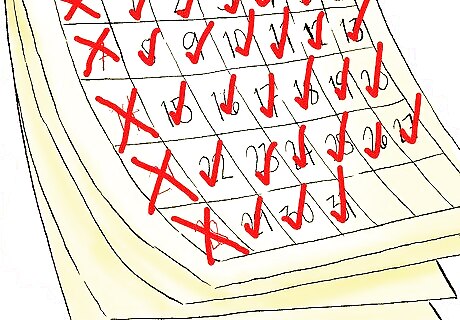
Note any days that you want to give yourself a break. Perhaps you decide that you want to give yourself one day off of studying per week, at least until the weeks immediately leading up to the exam. Somehow mark those days by writing “Day off” or “Rest day,” for example.
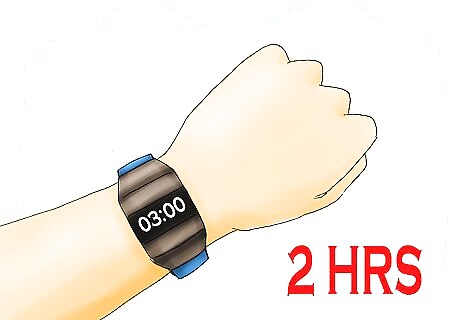
Consider how much time you want to study per day. The entrance exam is important, and you do want to devote a good deal of time to studying. However, you have other obligations and events going on in your life, as well. Decide how much time you can realistically spend studying each day. Perhaps you can devote 1-2 hours of studying every day or most days. On the other hand, maybe your schedule is a bit crazy due to a part-time job or a sports schedule, and you can only devote 30 minutes some days but a few hours other days. Plan the time out as much by the day as you can. Note how much time you plan to spend studying on each day leading up to the exam on your calendar.
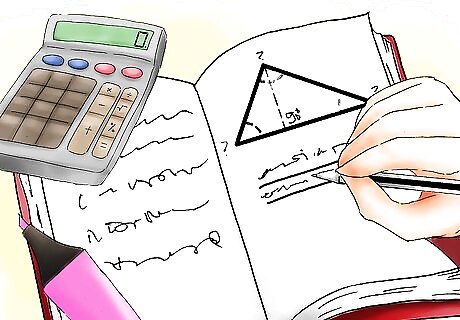
Plan out how you want to review. Entrance exams usually assess all of the knowledge you have gained in your entire schooling up to that point, unless they are for a particular course, in which they will assess all of your knowledge on that subject. It can be hard to pick and choose what is most important to review. It might be most beneficial to focus on the topics or subjects with which you struggle most. Reviewing everything you have ever learned will be tedious and likely impossible. Instead, have confidence in your strengths and focus on your weak areas to review and improve for the exam. Consider all of the subjects or topics that might come up on the exam and organize them in an order that makes sense. That could be chronologically, sequentially, or by some other method. Try asking friends who have already taken the entrance exam you will take for information about what topics came up on their exam. Yours likely will not be the same, but their insight can help you focus your review topics.
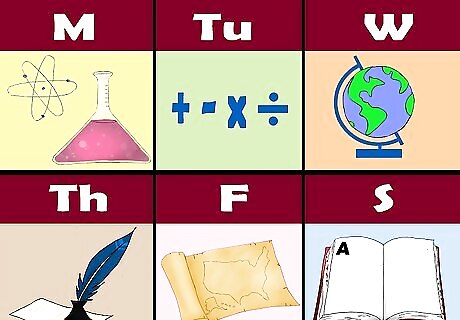
Mark which topic and/or subject you plan to study each day. Go through your calendar and mark every day with what you plan to study. Having it planned out already will save you from wasting time trying to decide what to study down the road.
Reviewing Material to Prepare
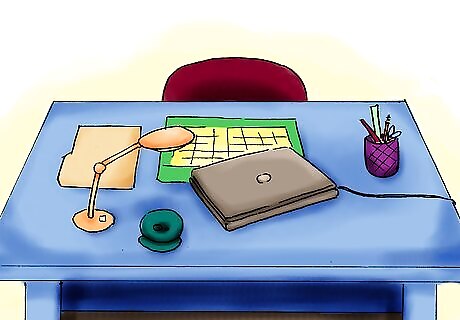
Find a calm, quiet space to study. Studies show that your study environment should work for you, so choose somewhere that you will be able to focus and avoid distractions. Study environments are highly individual. Make sure that this room has a desk or table at which you can sit or perhaps a comfortable chair. Having comfortable and useful furniture will help you maintain your study habits because you will not have to move to a more suitable place. Studies have also shown that it is helpful to rotate where you study. Find more than one good study spot, if you can.

Consider buying a test preparation book. While this is not necessary, having a test preparation book for your specific entrance exam can help to familiarize you with what types of questions are asked, how they are worded, and what exam scorers are looking for in answers. It will also help you to focus the topics you should study. These test preparation books often use discontinued exams from previous years. You can also check for online test preparation courses. Sometimes, you can find those courses or e-book versions of the test preparation books for free.

Bring the materials you need to study. For each individual study session, you should have a specific topic that you will study. Be sure to have with you everything that you need to study in order to help you stay on task. Notes from classes Old homework assignments, essays, and projects Scrap paper Pencils, erasers, and highlighters Computer or laptop, only if necessary (otherwise, it could be a distraction) Snacks and water
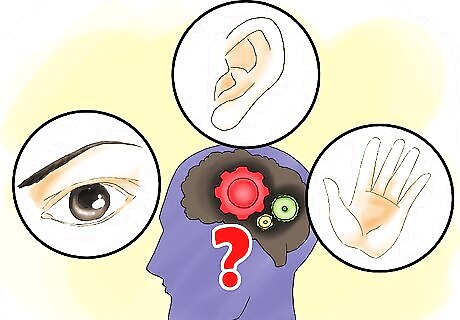
Know what kind of learner you are. There are different styles of learning, and knowing which style of learning best suits you will come in handy as you study. Visual learner: You learn best by seeing things, so videos, PowerPoint presentations, or even just watching someone work through something on paper or a chalkboard helps you learn. Auditory learner: You learn best by hearing things, so listening to a lecture or to a recording of a lecture can help you study. Kinesthetic learner: You learn best by doing things, so being able to work through problems in hands-on, experiential ways helps you.
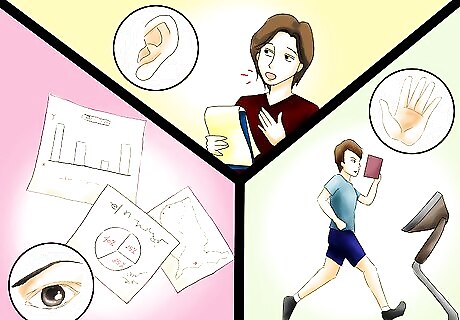
Tailor your study habits to the type of learner that you are. Once you have realized what style of learning best suits you, tailor your study habits to fit that so that you learn best. For visual learning, try re-writing your notes or turning your notes into charts, graphs, or maps. You can also turn your notes in semantic maps instead of traditional outline notes. If you are an auditory learner, it might help you to read or repeat your study material out loud. Participating in study groups with other people who are preparing for your same entrance exam could also help, due to opportunities for discussion about study topics with others. For kinesthetic learning, find a way to incorporate movement into your studying. For example, you could sit on a stability ball so you can gently bounce, or you can read over your notes or textbooks while you walk on a treadmill. You might also find it helpful to chew gum while you study, but be mindful that you may not be allowed to chew gum while taking your exam.
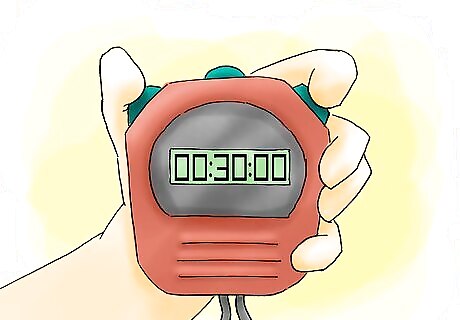
Set a timer for your studying. No matter what type of learner you are, it is important to take breaks and not to overdo your studying. Stress can actually cause you to not store new information and make you unresponsive to learning and reviewing, so be sure to give yourself breaks. Set the timer for about every 30 minutes of studying. When you have studied for 30 minutes, take a 5-10 minute break by taking a walk, going outside for some sunshine, or going to the restroom. Also set a timer for, or at least keep in mind, what time you want to stop. If you have marked on your study schedule that you will study for 90 minutes today, then stick to that time.

Find ways to make your studying fun. You will be much more likely to remember and really absorb the material you are studying if you can make it fun and joyful. Color-code your notes Play review games with a parent, tutor, friend, or study group Act out what you are studying Make videos or recordings of the study material using props
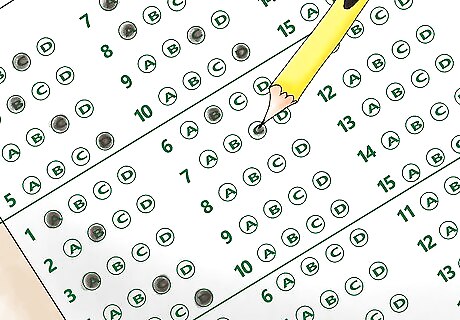
Take practice exams. In addition to reviewing material, one of the best ways to help you prepare for the exam is to take practice versions of it. Often, the practice tests are old, discontinued versions of the exams. This has many benefits: You will become familiar with the question wording and style. You will be able to hone how much time it takes you to answer questions. Be sure to time yourself while taking the practice exam according to the amount of time you will have when taking the real exam. You will be able to narrow what kind of information might show up on your exam. You will have a control against which you can measure your progress as you continue to study and prepare for the exam.
Practicing Calming Techniques

Think positively. As the exam gets closer, it will be really beneficial to think positively about the outcome. Thinking positively will motivate and energize you to do your best. Get in the habit of thinking positively by practicing positive self-talk. As you think about the upcoming entrance exam, be gentle and encouraging toward yourself. A good rule of thumb is to speak to yourself the way you would like to speak to others. If a negative thought comes to mind, then take the time to think about it rationally. Push it away with thoughts about yourself that are positive. For example, if you think to yourself, “This is too complicated,” then you can rebut it with the thought, “Yes, it's challenging, but I'll attempt it from a new angle.”
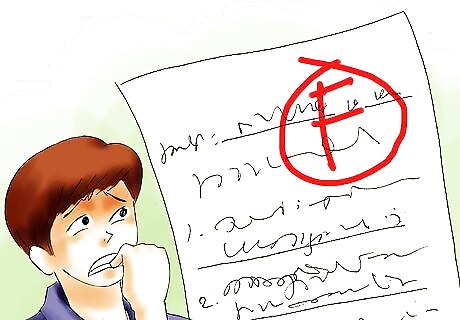
Avoid catastrophizing the situation. Catastrophizing is when you irrationally believe that a situation is far worse than it actually is. As you prepare for your entrance exam, it will be easy and tempting to have thoughts like, “I'm not going to pass this exam, which means I won't go to college, and then I won't be a successful adult.” However, this is catastrophizing, and you should avoid having these types of thoughts. Catastrophizing truly limits your opportunities in several areas of your life, because it sets you up for the so-called “self-fulfilling prophecy” in a negative way. If you tell yourself that you are not good enough to pass the entrance exam, then there is a good chance that you might actually do that—because you told yourself for so long that you are not good enough to pass it. In the scenario where you do find yourself catastrophizing, take steps to combat it. Begin recording the moments when you find yourself doing this, and after a week or so, look for patterns. Does it only happen when you are studying a certain subject that will be on your entrance exam? Does it only happen when you are practicing a particular question type, like essays? Pinpoint when it seems most likely to occur, and practice that positive self-talk when those moments arise to combat the catastrophizing.

Create strategies for overcoming obstacles during testing. While you are studying for the test, take the time to anticipate what obstacles you might encounter when taking the actual test. A helpful tool for doing this will be the practice tests: Notice which questions trip you up the most. Then, come up with strategies for handling those minor issues while you take your exam. Skip really challenging questions and come back to them later. Just remember to skip that question on the bubble sheet, if necessary. Use the process of elimination. Eliminate answers that are definitely incorrect or bogus, and make your answer choice from the remaining options. Go back and reread the question or related reading passage to double-check your answer. Read all of the answer options before selecting one. You may see one that you think is correct, but there may be a more correct answer further down the list. Practice highlighting or underlining important parts of the questions and reading passages. This will help you pull out key details when answering questions later. Read the questions before the reading passage. Then, you will know what information to seek.

Prioritize sleep habits. As a youth or teenager, you still need at least 8-10 hours of sleep per night. Getting this amount of sleep helps you to relax and reduce stress, which will overall calm you down and aid in your ability to focus. It is also important to try to have a consistent sleep schedule, going to bed and waking up at around the same time every day. This helps your biological clock, or your circadian rhythm, to maintain consistency with making sure you get quality sleep.

Take time off when you need it. You probably built into your study schedule days to take off or rest from studying. When those days arrive, it is very important that you actually take that time off. You need that time to decompress, calm down, and enjoy your life outside of studying.

Learn breathing techniques that you can utilize during the exam if you feel anxious. You can use the breathing exercises any time, but they will also come in handy during the exam if you feel yourself getting too stressed out. Calming Technique: Inhale for a count of four through your nose. Next, hold the breath for two. Lastly, exhale the breath for a count of six through your mouth. Equal Breathing: Inhale for a count of four, and then exhale for a count of four. Both your inhalation and exhalation should be through the nose. Repeat as necessary to calm down. Simply focus on making your exhales longer than your inhales. This is a simple trick to help you relax without any specific counting patterns while breathing.

Practice meditation or yoga. Meditation is excellent for reducing stress and calming nerves. Additionally, yoga provides a great avenue for meditation while also being somewhat active. To meditate, find a quiet place and sit comfortably. Gently rest your hands on your knees, and simply try to clear your mind of your issues and worries. Guided meditation tools are very helpful, but it works just as well to focus on your breathing and on clearing your mind for 10 minutes.

Exercise often to relieve stress. Exercise is not only a great way to get in shape, but it is also really helpful in calming you down and relieving stress and frustration. Almost any type of exercise is fine, but be sure to stick to forms of exercise that you know how to do so that you do not get injured. Running/jogging Walking Swimming Bicycling Sports—tennis, soccer, horseback riding, et cetera

Turn your nervousness into excitement. It is completely normal to be nervous, but it is a good idea to try to turn that into excitement about your exam. No one is ever really excited for an exam, but here are some positive thoughts you can have to help psyche you up for it: “Now I have the opportunity to show everyone how much I know!” “I've been working so hard at relearning these math equations. My math teacher will be so proud!” “I've worked so hard to prepare for this exam. I know it will all pay off!”
Preparing the Night Before
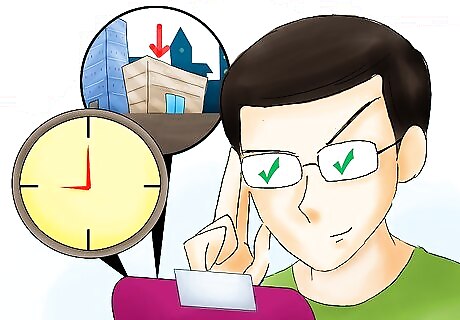
Know where and when your exam is. Double-check your information and be sure you know exactly where your exam will be taken and at what time you need to arrive. You often have to arrive early in order to allow time to check in and get to your assigned room.
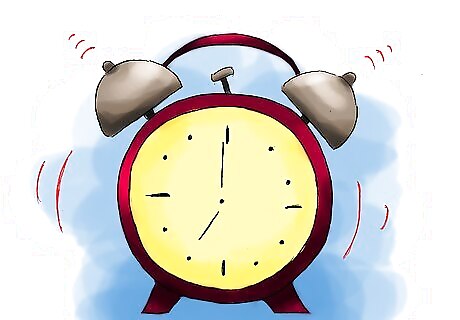
Set your alarm clock. Give yourself enough time to get up, shower (if you prefer morning showers), have a hearty breakfast, and get to your exam location.

Gather all of your supplies together. Put everything you need for your entrance exam into your backpack or other approved bag, if you are allowed one. Pencils and erasers Pens, if allowed or needed Calculator, if allowed or needed Bottle of water Snacks

Eat a healthy dinner and plan a healthy breakfast. Complex carbohydrates are great for sustained energy, because they take more time for the body to break down. Enjoy a dinner with a balance of complex carbohydrates, protein, and healthy fats. Plan for a breakfast that is higher in healthy fats and protein than carbohydrates; however, do not entirely eliminate the carbohydrates. The combination of the healthy fats and the protein will keep you feeling full longer and will not cause you to have an energy crash in the middle of your exam.
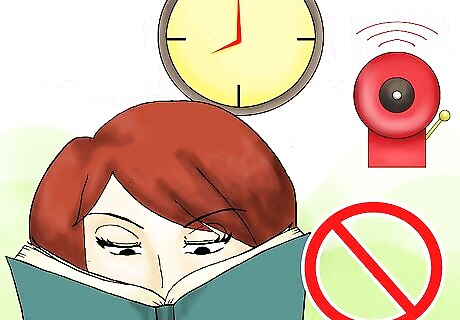
Avoid doing any last-minute cramming for the exam. When your nerves are high and you are trying to cram at the last minute, your brain likely will remember little to nothing of that last-minute review. Give yourself the night off to relax or do some calming.

Get at least eight hours of sleep. Go to bed as early as you can to make sure you get at least eight hours of sleep, though 9-10 hours of sleep is more highly recommended. That way, when you wake the next morning, you will feel well rested and calmer.



















Comments
0 comment